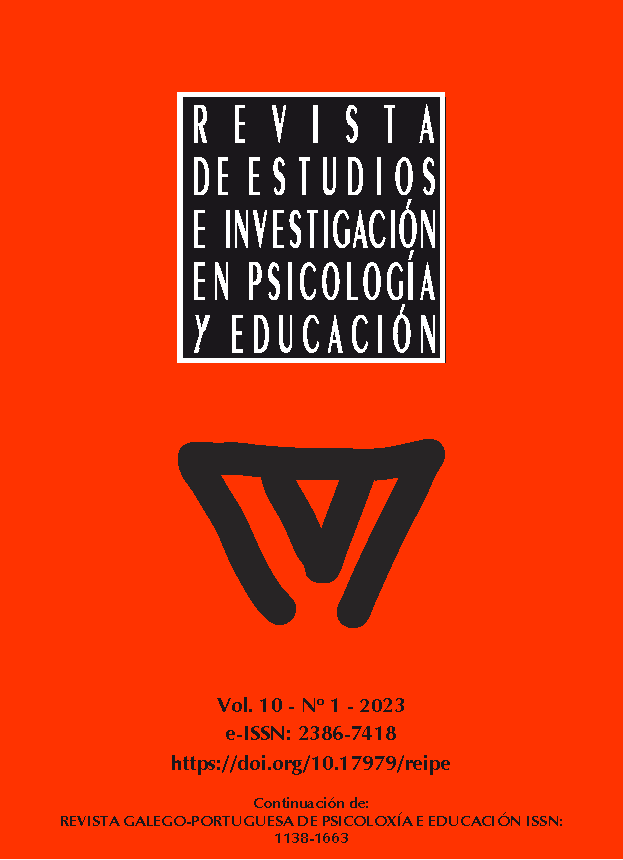Project-Based Learning: the student’s perspective on blended and online learning
Main Article Content
Abstract
The aim of this study is to identify the meanings attributed to Project-Based Learning (PBL) by university psychology students in relation to the activities involved, effort required and learning acquired in a blended learning environment prior to the COVID-19 pandemic and the distance learning substitute implemented during lockdown. The study uses a qualitative-phenomenological methodology to examine the participants’ experience of both modalities. The data were obtained from the discourse of 130 university psychology students: 67 blended and 63 distance. The analysis consisted of thematic coding based on a book of emergent categories and subcategories. The findings show that students in both modalities learned a range of different content, skills, knowledge and abilities through their project. More research is required to examine the impact of learning modality and PBL teacher experience.
Keywords:
Downloads
Article Details
References
ÁLVAREZ-GAYOU, Juan Luis (2003). Marcos referenciales interpretativos. En Alvarez-Gayou Jurgenson, J. L., Cómo hacer investigación cualitativa. Fundamentos y metodología (pp. 65-90). Paidós: México (2019).
AUSÍN, Vanesa; ABELLA, Víctor; DELGADO, Vanesa; & HORTIGÜELA, David (2016). Aprendizaje basado en proyectos a través de las TIC: una experiencia de innovación docente desde las aulas universitarias. Formación Universitaria, 9(3), 31-38. https://doi.org/10.4067/S0718-50062016000300005
AYAZ, Mehmet; & SÖYLEMEZ, Mikail (2015). The effect of the project-based learning approach on the academic achievements of the students in science classes in Turkey A meta-analysis study. Education & Science/Egitim Ve Bilim, 40(178), 255-283. https://doi.org/10.15390/EB.2015.4000
BRAUN, Virginia; & CLARKE, Victoria (2006). Using thematic analysis in psychology. Qualitative Research in Psychology, 3(2), 77-101. https://doi.org/10.1191/1478088706qp063oa
CHANPET, Punyapat; CHOMSUWAN, Komkrit; & MURPHY, Elizabeth (2018). Online project-Based learning and formative assessment. Technology, Knowledge and Learning, 25, 685–705. https://doi.org/10.1007/s10758-018-9363-2
CHEN, Cheng-Huan; & YANG, Yong-Cih; (2019). Revisiting the effects of project-based learning on students’ academic achievement: A meta-analysis investigating moderators. Educational Research Review, 26, 71-81. https://doi.org/10.1016/j.edurev.2018.11.001
CIBANGU, Sylvain; & HEPWORTH, Mark (2016). The uses of phenomenology and phenomenography: A critical review. Library Information Science Research, 38(2), 148-160. https://doi.org/10.1016/j.lisr.2016.05.001
COBO-GONZALES, Gonzalo; & VALDIVIA-CAÑOTTE, Sylvana Mariella (2017). Aprendizaje basado en proyectos. Pontificia Universidad Católica del Perú: Perú. https://repositorio.pucp.edu.pe/index/handle/123456789/170374
CUAED - Coordinación de Universidad Abierta y Educación a Distancia (2020). Modelo híbrido. En M. C. Barrón (Ed.), Propuesta de un modelo híbrido para la UNAM (pp. 63-93). Universidad Nacional Autónoma de México. https://www.humanindex.unam.mx/humanindex/consultas/detalle_libros.php?id=22891&rfc=QkFUQzU3MDEyMA==
DUARTE, Jakeline (2003). Ambientes de aprendizaje: una aproximación conceptual. Revista Iberoamericana de Educación, 33(1), 1-18. https://doi.org/10.35362/rie3312961
FERNÁNDEZ, Jaime; DOMÍNGUEZ, Judith Gabriela; & MARTÍNEZ, Patricia Lorena; (2020). De la educación presencial a la educación a distancia en época de pandemia por COVID-19. Experiencias de los docentes. Revista Electrónica sobre Cuerpos Académicos y Grupos de Investigación. 7(14), 87–110. https://www.cagi.org.mx/index.php/CAGI/article/view/212
GARCÍA-ARETIO, Lorenzo (2018). Blended learning y la convergencia entre la educación presencial y a distancia. Revista Iberoamericana de Educación a Distancia, 21(1), 9-22. https://doi.org/10.5944/ried.21.1.19683
GARCÍA-ARETIO, Lorenzo (2020). Bosque semántico: ¿educación/enseñanza/aprendizaje a distancia, virtual, en línea, digital, eLearning…? RIED Revista Iberoamericana de Educación a Distancia, 23(1), 09-28. https://doi.org/10.5944/ried.23.1.25495
GARCÍA-ARETIO, Lorenzo (2021) COVID-19 y educación a distancia digital: preconfinamiento, confinamiento y posconfinamiento. RIED. Revista Iberoamericana de Educación a Distancia, 24(1), 9-25. https://doi.org/10.5944/ried.24.1.28080
GARCÍA-ARETIO, Lorenzo (2022). Radio, televisión, audio y vídeo en educación. Funciones y posibilidades, potenciadas por el COVID-19. RIED. Revista Iberoamericana de Educación a Distancia, 25(1), 9-28. https://doi.org/10.5944/ried.25.1.31468
GONZÁLEZ-UGALDE, Carlos (2014). Investigación fenomenográfica. Magis, Revista Internacional de Investigación en Educación, 7(14), 141-158. https://doi.org/10.11144/Javeriana.M7-14.INFE
LEVITT, Heidi (2020). Reporting qualitative research in psychology: how to meet APA style journal article reporting standards. American Psychological Association.
LICEA, Jessica (2019). Aprendiendo al elaborar infografías didácticas: el discurso de estudiantes de psicología en foros de discusión en línea [Tesis de pregrado, Universidad Nacional Autónoma de México]. TESIUNAM https://tesiunam.dgb.unam.mx/F/BS5HKTVTV4G85SCYS9N88HEAN74A56LYAUFV7HYQDQNY9GHAMD-10217?func=full-set-set&set_number=489937&set_entry=000017&format=999
MARTÍ, José; HEYDRICH, Mayra; ROJAS, Marcia; & HERNÁNDEZ, Annia; (2010). Aprendizaje basado en proyectos. Revista Universidad EAFIT, 46(158), 11-21. https://publicaciones.eafit.edu.co/index.php/revista-universidad-eafit/article/view/743
MERRILL, David (2002). First principles of instruction. Educational Technology Research and Development, 50(3), 43-59. https://doi.org/10.1007/BF02505024
MERRILL, David (2017). A 50+ year search for effective, efficient and engaging instruction. Education Review, 24. https://doi.org/10.14507/er.v24.2220
PARIS, Scott; & AYRES, L. R. (1994). Becoming reflective students and teachers with portfolios and authentic assessment. American Psychological Association. https://doi.org/10.1037/10158-000
POZZO, María Isabel; ROSSO, Florencia; MARINA, Sílvia; & RICOU, Miguel; (2022). La identidad de la Psicología en Argentina. Revista Psicodebate: Psicología, Cultura y Sociedad, 22(2), 32-46. https://doi.org/10.18682/pd.v22i2.4996
RODRÍGUEZ-SABIOTE, Clemente; LORENZO-QUILES, Oswaldo; & HERRERA-TORRES, Lucía (2005). Teoría y práctica del análisis de datos cualitativos. Proceso general y criterios de calidad. Revista Internacional de Ciencias Sociales y Humanidades, SOCIOTAM, 15(2), 133-154. https://www.redalyc.org/articulo.oa?id=65415209
RODRÍGUEZ-VITE, Hugo (2019). Ambientes de aprendizaje. Boletín Científico, Ciencia Huasteca. https://www.uaeh.edu.mx/scige/boletin/huejutla/n4/e1.html
SANTOS-SOLÓRZANO, Roberto; GONZÁLEZ-FLORES, Patricia; & SÁNCHEZ-MENDIOLA, Melchor (2022). Glosario de innovación educativa. Lista de términos clave. Coordinación de Universidad Abierta, Innovación Educativa y Educación a Distancia. https://www.innovacioneducativa.unam.mx:8443/jspui/handle/123456789/5567
TOLEDO-Morales, Purificación; & SÁNCHEZ GARCÍA, José Manuel (2018). Aprendizaje basado en proyectos: Una experiencia universitaria. Revista del Currículum y Formación del Profesorado, 22 (2), 474-491. https://doi.org/10.30827/profesorado.v22i2.7733
UNESCO - Organización de las Naciones Unidas para la Educación, la Ciencia y la Cultura (2020). Apoyar a los docentes al personal educativo en tiempos de crisis. Respuesta educativa de la UNESCO a la COVID-19. UNESCO. https://unesdoc.unesco.org/ark:/48223/pf0000373338_spa
YILMAZ, Ramazan; KARAOGLAN-YILMAZ, Fatma Gizem; & KESER, Hafize (2020). Vertical versus shared e-leadership approach in online project-based learning: a comparison of self-regulated learning skills, motivation, and group collaboration processes. Journal of Computing in Higher Education, 32, 628–654 https://doi.org/10.1007/s12528-020-09250-2
ŽEROVNIK, Alenka; & NANCOVSKA, Irena (2021). Project-based learning in higher education. En C. V. De Carvalho y M. Bauters (Eds.), Technology Supported Active Learning Student-Centered Approaches (pp. 31-58). https://doi.org/10.1007/978-981-16-2082-9_3



